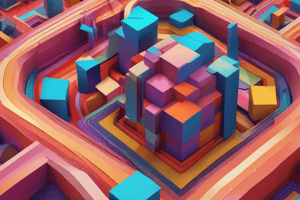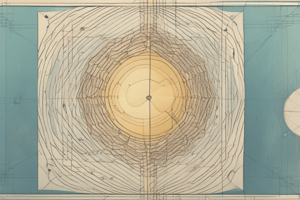Podcast
Questions and Answers
What is the formula to calculate the perimeter of a square?
What is the formula to calculate the perimeter of a square?
4 x side length
How is the area of a rectangle calculated?
How is the area of a rectangle calculated?
Length x Width
Explain the concept of surface area in three-dimensional objects.
Explain the concept of surface area in three-dimensional objects.
Surface area is the total area of all faces of a three-dimensional object.
What is the perimeter of a triangle with side lengths 3, 4, and 5 units?
What is the perimeter of a triangle with side lengths 3, 4, and 5 units?
Calculate the area of a circle with radius 6 units.
Calculate the area of a circle with radius 6 units.
How is the surface area of a cube calculated?
How is the surface area of a cube calculated?
What is the formula for finding the volume of a rectangular prism?
What is the formula for finding the volume of a rectangular prism?
Explain how to calculate the surface area of a cylinder.
Explain how to calculate the surface area of a cylinder.
If the side length of a square is 8 units, what is its perimeter?
If the side length of a square is 8 units, what is its perimeter?
Why is understanding volume important in fields like engineering?
Why is understanding volume important in fields like engineering?
Study Notes
Discovering Dimensions: Perimeter, Area, Surface Area, and Volume
Perimeter, area, surface area, and volume are fundamental concepts that help us understand and quantify the shape and size of objects in our world. These dimensions allow us to solve complex problems and make informed decisions in fields as diverse as architecture, engineering, and everyday life.
Perimeter
The perimeter, also known as the boundary length or circumference, is the distance around the outer edge of a two-dimensional shape. It's calculated by adding up the lengths of all sides and can be expressed as a single number. For example, a square with sides of length 5 would have a perimeter of (5 \times 4 = 20) units.
Area
The area of a two-dimensional shape is the amount of space it occupies. It's calculated by multiplying the length of one side by itself for a square or rectangle, or by using mathematical formulas for more complex shapes like triangles and circles. For example, a square with sides of length 5 would have an area of (5 \times 5 = 25) square units.
Surface Area
The surface area of a three-dimensional object is the total area of all its faces. This is an essential concept in fields like architecture, where surface area can influence factors like heat loss and aesthetic design. Surface area is typically calculated using formulas specific to each shape, such as the pyramid's surface area formula, which involves adding the area of the base to the area of four triangles on its sides.
Volume
The volume of a three-dimensional object is the amount of space it occupies. It's calculated using mathematical formulas specific to each shape. The formulas reflect the object's length, width, and height. For example, a cube with sides of length 5 would have a volume of (5 \times 5 \times 5 = 125) cubic units.
These four dimensions—perimeter, area, surface area, and volume—are fundamental concepts that allow us to visualize, analyze, and compare the shapes and sizes of objects in our world. They are essential tools in math, science, and engineering, forming a foundation for solving problems and understanding the world around us.
Studying That Suits You
Use AI to generate personalized quizzes and flashcards to suit your learning preferences.
Description
Test your knowledge on the fundamental concepts of perimeter, area, surface area, and volume. Explore how to calculate and visualize these dimensions for two-dimensional and three-dimensional shapes. Enhance your understanding of geometry and apply these concepts to real-world scenarios in architecture, engineering, and more.




